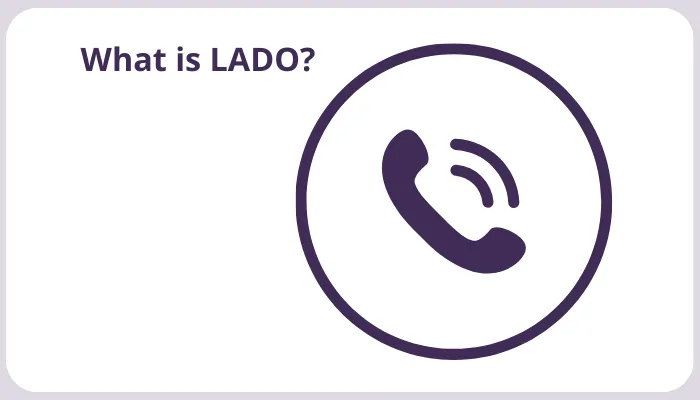Every child's well-being matters.
Best Practice Ideas for Safeguarding Articles
Quick Access

What is LADO?
Custom HTML/CSS/JAVASCRIPTLADO, which stands for Local Authority Designated Officer, plays a pivotal role in safeguarding children within the United Kingdom. The LADO is entrusted with the responsibility of managing and overseeing allegations of abuse made against individuals who work with children, thereby ensuring their safety and well-being.
Here are some critical aspects of the LADO role:
Responsibilities of a LADO
Managing Allegations: The LADO handles allegations and concerns about people who work with children in various capacities, such as teachers, social workers, volunteers, and other professionals.
Coordination: The LADO collaborates closely with different agencies, including the police, social services, and the accused person's employer. This comprehensive approach ensures that allegations are thoroughly and appropriately investigated, instilling confidence in the process.
Advice and Guidance: The LADO is a valuable source of support, providing employers and voluntary organisations with advice and guidance on handling allegations and ensuring children's safety. This assistance underscores the LADO's commitment to safeguarding.
Monitoring and Tracking: They monitor and track the progress of investigations to ensure they are completed efficiently and that appropriate actions are taken.
Risk Management: The LADO's role in risk management is crucial. They assess the risk the accused individual poses and advise on interim measures, such as suspension, to protect children during the investigation. This could also include recommending changes to policies or procedures to prevent similar incidents in the future.
When to Contact a LADO
Allegations of Harm: When there are allegations or suspicions that a person who works with children has harmed a child, posed a risk of harm, or behaved in a way that indicates they may be unsuitable to work with children.
Professional Advice: When an organisation needs advice on safeguarding policies and procedures, particularly regarding managing allegations against staff or volunteers.
Concerns about Behavior: When there are concerns about an individual's behaviour towards children that may not constitute a direct allegation but require further assessment and advice.
Process Involved
Referral: Allegations are referred to the LADO, usually by the employer or organisation where the accused works.
Initial Discussion: The LADO discusses the allegation with the referrer to understand the context and decide the next steps.
Strategy Meeting: If the allegation is serious, the LADO may organise a strategy meeting involving relevant agencies may be convened to plan the investigation.
Investigation: The LADO plays a crucial role in overseeing the investigation, ensuring it is conducted fairly and impartially, with the child's safety as the primary concern. They do not conduct the investigation themselves, but they ensure that it is thorough, timely, and respects the rights of all parties involved.
Outcome: Once the investigation is complete, the LADO plays a pivotal role in helping determine the outcome and any necessary actions. This could include recommending disciplinary measures, reporting to professional bodies, or changing safeguarding policies or procedures.
Importance of the LADO
The role of the LADO is not just about managing individual cases. It is about maintaining a robust safeguarding framework within communities and organisations. By ensuring that allegations are handled appropriately, the LADO helps protect children from harm and upholds the integrity of those who work with children. This, in turn, contributes to the overall safety and well-being of children in our society.
For more detailed information about the LADO's role and procedures, consult local government websites or safeguarding policies specific to your area.
AUTHOR:- Iona has nearly 10 years of experience supporting nurseries and childminders in curriculum planning, leadership, and safeguarding. Her writing is informed by public information and sector insight, aiming to provide accessible, practical support for professionals working with children. She is part of the On the Button team, helping deliver Well-being, Safeguarding and Complaint Management Software that empowers practitioners to identify concerns early and act confidently.
On the Button provides innovative software tailored to the needs of the early years sector, with a strong focus on EYFS well-being and early years safeguarding. Our tools help senior practitioners to confidently track concerns, maintain robust records, and respond effectively — all while meeting statutory guidance. From early years complaint management to team-wide safeguarding alerts, our platform puts children's safety and emotional health first.
Quick Access

What is LADO?
Custom HTML/CSS/JAVASCRIPTLADO, which stands for Local Authority Designated Officer, plays a pivotal role in safeguarding children within the United Kingdom. The LADO is entrusted with the responsibility of managing and overseeing allegations of abuse made against individuals who work with children, thereby ensuring their safety and well-being.
Here are some critical aspects of the LADO role:
Responsibilities of a LADO
Managing Allegations: The LADO handles allegations and concerns about people who work with children in various capacities, such as teachers, social workers, volunteers, and other professionals.
Coordination: The LADO collaborates closely with different agencies, including the police, social services, and the accused person's employer. This comprehensive approach ensures that allegations are thoroughly and appropriately investigated, instilling confidence in the process.
Advice and Guidance: The LADO is a valuable source of support, providing employers and voluntary organisations with advice and guidance on handling allegations and ensuring children's safety. This assistance underscores the LADO's commitment to safeguarding.
Monitoring and Tracking: They monitor and track the progress of investigations to ensure they are completed efficiently and that appropriate actions are taken.
Risk Management: The LADO's role in risk management is crucial. They assess the risk the accused individual poses and advise on interim measures, such as suspension, to protect children during the investigation. This could also include recommending changes to policies or procedures to prevent similar incidents in the future.
When to Contact a LADO
Allegations of Harm: When there are allegations or suspicions that a person who works with children has harmed a child, posed a risk of harm, or behaved in a way that indicates they may be unsuitable to work with children.
Professional Advice: When an organisation needs advice on safeguarding policies and procedures, particularly regarding managing allegations against staff or volunteers.
Concerns about Behavior: When there are concerns about an individual's behaviour towards children that may not constitute a direct allegation but require further assessment and advice.
Process Involved
Referral: Allegations are referred to the LADO, usually by the employer or organisation where the accused works.
Initial Discussion: The LADO discusses the allegation with the referrer to understand the context and decide the next steps.
Strategy Meeting: If the allegation is serious, the LADO may organise a strategy meeting involving relevant agencies may be convened to plan the investigation.
Investigation: The LADO plays a crucial role in overseeing the investigation, ensuring it is conducted fairly and impartially, with the child's safety as the primary concern. They do not conduct the investigation themselves, but they ensure that it is thorough, timely, and respects the rights of all parties involved.
Outcome: Once the investigation is complete, the LADO plays a pivotal role in helping determine the outcome and any necessary actions. This could include recommending disciplinary measures, reporting to professional bodies, or changing safeguarding policies or procedures.
Importance of the LADO
The role of the LADO is not just about managing individual cases. It is about maintaining a robust safeguarding framework within communities and organisations. By ensuring that allegations are handled appropriately, the LADO helps protect children from harm and upholds the integrity of those who work with children. This, in turn, contributes to the overall safety and well-being of children in our society.
For more detailed information about the LADO's role and procedures, consult local government websites or safeguarding policies specific to your area.
AUTHOR:- Iona has nearly 10 years of experience supporting nurseries and childminders in curriculum planning, leadership, and safeguarding. Her writing is informed by public information and sector insight, aiming to provide accessible, practical support for professionals working with children. She is part of the On the Button team, helping deliver Well-being, Safeguarding and Complaint Management Software that empowers practitioners to identify concerns early and act confidently.
On the Button provides innovative software tailored to the needs of the early years sector, with a strong focus on EYFS well-being and early years safeguarding. Our tools help senior practitioners to confidently track concerns, maintain robust records, and respond effectively — all while meeting statutory guidance. From early years complaint management to team-wide safeguarding alerts, our platform puts children's safety and emotional health first.

What is LADO?
Custom HTML/CSS/JAVASCRIPTLADO, which stands for Local Authority Designated Officer, plays a pivotal role in safeguarding children within the United Kingdom. The LADO is entrusted with the responsibility of managing and overseeing allegations of abuse made against individuals who work with children, thereby ensuring their safety and well-being.
Here are some critical aspects of the LADO role:
Responsibilities of a LADO
Managing Allegations: The LADO handles allegations and concerns about people who work with children in various capacities, such as teachers, social workers, volunteers, and other professionals.
Coordination: The LADO collaborates closely with different agencies, including the police, social services, and the accused person's employer. This comprehensive approach ensures that allegations are thoroughly and appropriately investigated, instilling confidence in the process.
Advice and Guidance: The LADO is a valuable source of support, providing employers and voluntary organisations with advice and guidance on handling allegations and ensuring children's safety. This assistance underscores the LADO's commitment to safeguarding.
Monitoring and Tracking: They monitor and track the progress of investigations to ensure they are completed efficiently and that appropriate actions are taken.
Risk Management: The LADO's role in risk management is crucial. They assess the risk the accused individual poses and advise on interim measures, such as suspension, to protect children during the investigation. This could also include recommending changes to policies or procedures to prevent similar incidents in the future.
When to Contact a LADO
Allegations of Harm: When there are allegations or suspicions that a person who works with children has harmed a child, posed a risk of harm, or behaved in a way that indicates they may be unsuitable to work with children.
Professional Advice: When an organisation needs advice on safeguarding policies and procedures, particularly regarding managing allegations against staff or volunteers.
Concerns about Behavior: When there are concerns about an individual's behaviour towards children that may not constitute a direct allegation but require further assessment and advice.
Process Involved
Referral: Allegations are referred to the LADO, usually by the employer or organisation where the accused works.
Initial Discussion: The LADO discusses the allegation with the referrer to understand the context and decide the next steps.
Strategy Meeting: If the allegation is serious, the LADO may organise a strategy meeting involving relevant agencies may be convened to plan the investigation.
Investigation: The LADO plays a crucial role in overseeing the investigation, ensuring it is conducted fairly and impartially, with the child's safety as the primary concern. They do not conduct the investigation themselves, but they ensure that it is thorough, timely, and respects the rights of all parties involved.
Outcome: Once the investigation is complete, the LADO plays a pivotal role in helping determine the outcome and any necessary actions. This could include recommending disciplinary measures, reporting to professional bodies, or changing safeguarding policies or procedures.
Importance of the LADO
The role of the LADO is not just about managing individual cases. It is about maintaining a robust safeguarding framework within communities and organisations. By ensuring that allegations are handled appropriately, the LADO helps protect children from harm and upholds the integrity of those who work with children. This, in turn, contributes to the overall safety and well-being of children in our society.
For more detailed information about the LADO's role and procedures, consult local government websites or safeguarding policies specific to your area.
AUTHOR:- Iona has nearly 10 years of experience supporting nurseries and childminders in curriculum planning, leadership, and safeguarding. Her writing is informed by public information and sector insight, aiming to provide accessible, practical support for professionals working with children. She is part of the On the Button team, helping deliver Well-being, Safeguarding and Complaint Management Software that empowers practitioners to identify concerns early and act confidently.
On the Button provides innovative software tailored to the needs of the early years sector, with a strong focus on EYFS well-being and early years safeguarding. Our tools help senior practitioners to confidently track concerns, maintain robust records, and respond effectively — all while meeting statutory guidance. From early years complaint management to team-wide safeguarding alerts, our platform puts children's safety and emotional health first.
Quality Early Years Ltd.,
Dickens House,
Guithavon Street,
Witham, Essex,
England, CM8 1BJ
© Quality Early Years Ltd 2025

Find On the Button
on Social Media

